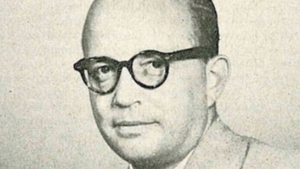Lev E. Dobriansky
(spook, academic) | |
|---|---|
 | |
| Born | November 9 1918 |
| Died | January 30 2008 (Age 89) |
| Nationality | US |
| Alma mater | New York University |
| Children | • Paula Dobriansky • Larisa Dobriansky |
| Interests | • Ukraine • World Anti-Communist League |
Academic working with Ukrainian exile groups for the CIA. | |
Lev E. Dobriansky was a professor of economics at Georgetown University[1], and a hardline Cold-Warrior who was heavily involved in the leadership of Ukrainian/White Russian emigree organizations, a nationalist angle against the Soviet Union eagerly exploited by the US government.
Through his powerful connections in Congress, the Republican National Committee, the military-industrial complex, the Ukrainian diaspora and far-right anticommunist networks at home and abroad, Dobriansky played a pivotal role in the forging of a warm friendship between the Nazi collaborators in the Ukrainian exile organization OUN-B and fervent anticommunists in the United States. He was on the US board of the infamous World Anti-Communist League in the 1970s.
Family
Dobriansky was born in New York City to parents of Ukrainian heritage.
His daughter, Paula Dobriansky, was a senior officer in the U.S. State Department under President George W. Bush, and one of the early neo-conservatives, signatory of the PNAC.
His other daughter, Larisa Dobriansky, is a lawyer specializing in "environmental issues" who has worked at the U.S. Department of Energy. She also was an environmental lawyer at Akin Gump.
Career
"Dobriansky graduated from New York University (B.S., 1941; M.A., 1943; Ph. D., 1951), where he also worked between 1942-1948 as an instructor in economics.
During World War 2, he worked for the OSS (the forerunner of the CIA).[citation needed]
Since 1948 until his retirement in 1987 he worked at Georgetown University; as assistant professor of economics (1948-1952), associate professor of economics (1952-1960), and professor of economics (1960-), where he taught classes as "Soviet Economics."
Among his students was Kateryna Yushchenko, the future First Lady of Ukraine, rumored to be a CIA plant.[2][citation needed]
He was director of the Cold War front Institute on Comparative Economic and Political Systems since 1970. He was a faculty member at the National War College in 1957-1958. He has been a consultant with the US Department of State, the International Communication Agency, and the United States House of Representatives.
In addition to his work with the United States government, Dobriansky also worked in an (unspecified) official capacity in Chile from 1975 to 1976.
On October 25, 1982, Dobriansky was nominated by President Ronald Reagan as United States Ambassador to the Bahamas; he succeeded William B. Schwartz. Dobriansky maintained this position until August 30, 1986.
Anti-communist Activities
Dobriansky was, in the course of his life, also involved in the Ukrainian National Information Service, the American Council for World Freedom, the Ukrainian Congress Committee of America, and the United States Council for World Freedom. Dobriansky and Stepan Bandera met in Europe at least once after the war.
Dobriansky wrote the Captive Nations Week Resolution, which was adopted by the United States Congress and signed into law by President Dwight D. Eisenhower in July 1959. As a result of his activism, this resolution has been proclaimed every year by each successive president. He also founded and chaired for many years the related National Captive Nations Committee.
In September, 1960, Dobriansky gave his opinions before the House Un-American Activities Committee on the role of Soviet premier Nikita Khrushchev when he was party chairman in the Ukrainian SSR.
Dobriansky secured a US visa for Yaroslav Stetsko (the founder of the Anti-Bolshevik Bloc of Nations) to enter the United States despite the opposition of the CIA and State Department. Declassified CIA files reveal that the government “intended to deny him for the rest of his life" because of his Nazi past.[3]
In 1993, Congress authorized the NCNC to begin raising funds to build a Victims of Communism Memorial. To this end, Dobriansky helped create the Victims of Communism Memorial Foundation, along with such notables as Lee Edwards, Grover Norquist, and Zbigniew Brzezinski. He was the Foundation's first chairman.
Dobriansky also played a role in the construction of a Washington, D.C monument of Taras Shevchenko, an Ukrainian nationalist and artist.
Other activities
- Ukrainian National Information Service (UNIS), first director[4]
- Office of Strategic Services (OSS), officer during WWII (OSS was the forerunner of the CIA)
- American Council for World Freedom (ACWF), board member
- National Captive Nations Committee, Chairman
- United States Council for World Freedom, Director
- Victims of Communism Memorial Foundation Chairman Emeritus[5]
References
- ↑ http://www.georgetown.edu/undergrad/bulletin/emeriti.html
- ↑ https://covertactionmagazine.com/2018/07/04/a-fair-question-is-paula-dobriansky-a-neo-banderite/
- ↑ https://covertactionmagazine.com/2018/07/04/a-fair-question-is-paula-dobriansky-a-neo-banderite/
- ↑ http://www.ukrweekly.com/Archive/1997/459705.shtml
- ↑ http://www.victimsofcommunism.org/about/directors.php